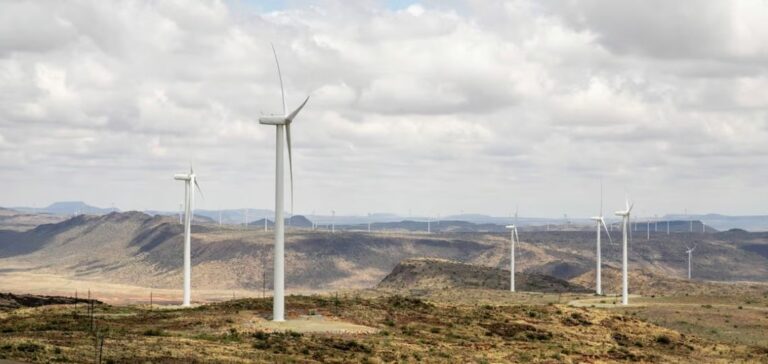EDF Renewables is developing 1.2GW of renewable electricity capacity in South Africa, comprising 763MW of wind, 355MW of solar and 75MW of storage. This initiative, which includes the construction of eight facilities spread over three major projects, aims to provide a significant solution to thecountry’s energy deficit.
Projects in detail
Projects under construction by EDF Renewables include Koruson 1, Koruson 2 and Umoyilanga. Koruson 1, with a total capacity of 420MW, comprises three wind farms: Phezukomoya, San Kraal and Coleskop. Koruson 2, with 520MW, includes two 140MW wind farms, Umsobomvu and Hartebeesthoek, as well as a 240MW solar power plant, Mooi Plaats, developed by Envusa Energy, a joint venture between EDF Renewables and the Anglo American group. Finally, the Umoyilanga hybrid project combines production from the future 115MW Avondale solar power plant and the 63MW Dassiesridge onshore wind farm, with 75MW of battery capacity.
Economic and social impact
These projects represent a total investment of around 1.65 billion euros. They will not only help reduce South Africa’s energy deficit, but also create a significant number of jobs, particularly during the construction phase. Around 40% of project value will come from locally produced goods and services, and around 1% of sales will be allocated to socio-economic development initiatives benefiting local communities.
Contribution to the Energy Transition
The planned production of almost 4TWh per year from these facilities will help reduce power cuts in South Africa, which reached 14.4TWh in 2023. Tristan de Drouas, head of EDF Renewables in South Africa, expressed his pride in helping to meet the country’s energy needs through wind and solar farms, both via government programs and through the joint venture with Anglo American group, Envusa Energy. The Koruson and Umoyilanga projects illustrate EDF Renewables’ ability to provide innovative and sustainable energy solutions. The Umoyilanga project, in particular, is an innovative hybrid project operating as a virtual power plant, combining solar, wind and storage capacities distributed over two sites 900 km apart, providing permanently available energy for the South African power grid.
Outlook for the future
The gradual commissioning of these facilities between 2024 and 2026 marks an important step in South Africa’s commitment to a sustainable energy transition. With its Koruson 1, Koruson 2 and Umoyilanga projects, EDF Renewables is helping to reduce South Africa’s energy deficit. These initiatives not only provide clean electricity, but also promote the economic and social development of local communities, consolidating South Africa’s position in the global energy transition.






















